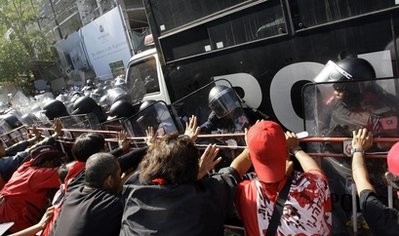Scuffles broke out in Bangkok Tuesday between riot police and thousands of angry protesters, who vowed to "break every checkpoint" in the capital in a bid to topple the government.

The red-shirted supporters of fugitive ex-premier Thaksin Shinawatra lobbed plastic bottles and pushed against police barricades, paralysing Bangkok's shopping and hotel district for a fourth day, despite the threat of arrest.
"We are ready to fight and die here," Red Shirt leader Nattawut Saikuar said with a raised fist on a rally stage.
"The government put pressure on us, but we are staying put," he said. "Now we will retaliate with our own offensive."
Riot police earlier surrounded tens of thousands of Red Shirts who have been rallying in the city's commercial centre since Saturday, after the government declared it was illegal to gather there and on 11 other routes.
"We will resume our march on the 11 banned roads and break every checkpoint," Nattawut told the crowd, calling for thousands of protesters to drive the military back to the barracks.
Soon afterwards, a group of red-shirted protesters on motorbikes forced their way past a security checkpoint on one road in the capital, knocking over a policeman, an AFP reporter witnessed.
No injuries were reported following the minor skirmishes.
The Reds, mostly from the Thailand's poor north, say the Prime Minister Abhisit Vejjajiva's government is illegitimate because it came to power through a parliamentary vote in 2008 after a court stripped Thaksin's allies of power.
"We will not end our demand for house dissolution. I'm not afraid of being arrested," said Noolah Ungpao, a 50-year-old farmer from the country's northeast.
The Thai authorities reassured the public that they were not planning to crackdown on the protesters, and later called off the riot police, but said they were ready to enforce the law to clear them from the tourist district.
"There is no crackdown and we will restore normalcy ... as soon as possible," Colonel Sunsern Kaewkumnerd said in a national television address.
Red-clad protesters waving flags swarmed downtown Bangkok on foot, by motorbike and in cars, causing gridlock on major roads and forcing major stores to remain closed.
The military has mounted a heavy security response, deploying 50,000 personnel at one point to try to contain the protests, which drew as many as 100,000 people on the first day on March 14.
As many as 50,000 protesters massed late Monday in the tourist heartland and about 38,000 remained as of midday Tuesday, according to police.
The government wants to avoid a repeat of last April's clashes with Red Shirts that left two people dead, six months after riot police took on the rival Yellow Shirts in bloody scenes outside parliament.
"We have specifically given instructions to the officers they cannot cause confrontation or use force excessively," said government spokesman Panitan Wattanayagorn.
But he said the protesters could be prosecuted if they do not allow traffic to flow through the key commercial area.
The Reds' gathering in the tourist hub has been banned under a strict security law that could land the protesters with a year in jail.
The authorities will seek arrest warrants for 10 protest leaders Tuesday, said deputy prime minister Suthep Thaugsuban, who is in charge of security.
"They would be arrested on stage," he told reporters.
Business chiefs have warned the protests could inflict heavy losses on tourism and other industries.
Thai society is split between the Reds, who accuse Abhisit's government of being elitist and army-backed, and the Yellow Shirts, supporters of the country's establishment who accuse Thaksin of gross corruption.
Thaksin, a billionaire former telecoms tycoon, lives abroad to avoid a jail term for graft at home.







)
















